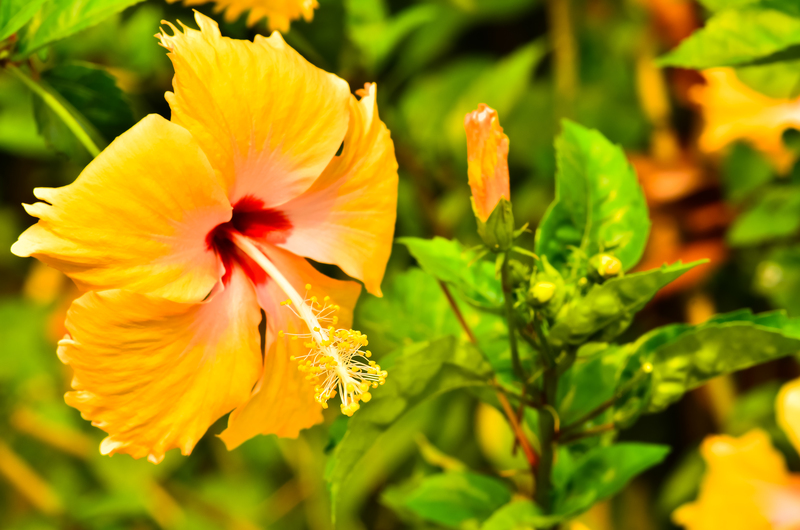The Ultimate Tips for Successful Herb Gardening
Posted on 07/09/2025
The Ultimate Tips for Successful Herb Gardening
For countless enthusiasts and aspiring green thumbs, cultivating a thriving herb garden is both a rewarding hobby and a valuable source of fresh flavors for the kitchen. Whether you're aiming to grow basil on your windowsill or dream of harvesting a lush outdoor patch of rosemary, successful herb gardening boils down to a mix of proper planning, attentive care, and a sprinkle of patience. In this comprehensive guide, we present the best advice for successful herb gardening--covering everything from selecting the right plants to harvesting and troubleshooting. Let's dig in!
Why Start Your Own Herb Garden?
There are numerous reasons why herb gardening has captivated gardeners for generations. Homegrown herbs are fresher, tastier, less expensive, and often more nutritious than store-bought varieties. Plus, gardening is a great way to relax, connect with nature, and even teach kids about responsibility and sustainability.
Key Benefits of Herb Gardening
- Convenient Access: Pick fresh herbs right when you need them.
- Cost-Effective: Save money over time by growing your own versus buying packaged herbs.
- Better Flavor and Nutrition: Homegrown herbs often boast superior flavor and more potent nutrients.
- Eco-Friendly: Reduce food waste and packaging by harvesting only what you'll use.
- Therapeutic: Gardening helps relieve stress and boosts mental well-being.

Understanding the Basics of Herb Gardening
Before you begin planting, it's essential to understand the fundamentals of successful herb gardening. These foundational concepts will ensure your culinary garden thrives, indoors or out.
Choosing the Right Herbs for Your Garden
Not all herbs are created equal--and not all will flourish in your unique growing conditions. Consider the following when selecting your plants:
- Climate: Are you gardening indoors or outdoors? Is your region cold or warm?
- Sunlight: Most culinary herbs crave at least 6 hours of sunlight daily.
- Space: Some herbs spread rapidly and need more room; others will thrive in pots.
- Purpose: Do you need herbs for cooking, teas, aromatherapy, or medicinal uses?
Popular beginner-friendly herbs include basil, chives, parsley, cilantro, thyme, oregano, mint, and rosemary.
Container Herb Gardening vs. In-Ground Herb Gardening
A crucial decision for every gardener is whether to grow herbs in containers or plant them directly in the ground. Each approach has its pros and cons:
- Container Gardening: Ideal for limited space, apartments, balconies, and kitchens. Easy to control soil conditions and move plants as needed.
- In-Ground Gardening: Best for larger yields and perennial herbs. Offers greater root space, less frequent watering, and easy expansion.
Essential Tips for Growing Successful Herb Gardens
1. Select Quality Seeds or Healthy Seedlings
Start with fresh, high-quality seeds or robust nursery-bought seedlings. Healthy beginnings reduce the risk of disease and give your garden the best chance of success. Look for green, unblemished leaves and firm stems.
2. Use the Right Soil for Herb Plants
Most herbs thrive in well-draining, nutrient-rich soils. A light potting mix with some organic compost is often ideal. Avoid heavy, clay soils that retain water and restrict root growth. For container gardens, choose a reputable organic mix labeled for herbs or vegetables.
- Sandy or loamy soils are preferred for Mediterranean herbs like thyme, oregano, and rosemary.
- Rich, moist soils benefit lush herbs like basil and parsley.
3. Ensure Proper Light Exposure
Light is perhaps the most vital ingredient for a productive herb garden. Most culinary herbs require a minimum of 6-8 hours of direct sunlight per day. Some, such as mint and parsley, tolerate partial shade.
- Indoors: Place containers on a south-facing windowsill or supplement with grow lights if sunlight is scarce.
- Outdoors: Choose the sunniest location, ideally sheltered from harsh afternoon rays if you live in a hot climate.
4. Watering Wisely for Healthier Herbs
Herbs typically prefer a slightly drier environment than vegetables. Overwatering can lead to root rot and fungal diseases. Follow these tips for successful herb plant watering:
- Check soil moisture: Insert your finger about an inch deep--water only if the soil feels dry.
- Morning watering: Water early in the day to minimize disease.
- Avoid wetting foliage: Focus on the root zone to reduce fungal risks.
- Use well-draining pots: Ensure containers have drainage holes.
5. Master Herb Fertilizer Techniques
Most herbs don't require excessive feeding, as excessive nitrogen can diminish their essential oils, reducing flavor. For organic herb gardening, add compost or a slow-release organic fertilizer once or twice per growing season.
- Feed lightly: Over-fertilization promotes lush growth at the expense of flavor.
- Topdress: Sprinkle compost or worm castings around plants for ongoing nutrition.
6. Prune and Harvest Regularly
Consistent pruning is the secret to bushier, more productive herb plants. Pinch or snip stems above a leaf node to encourage branching. Never take more than one-third of a plant at a time, and always use clean, sharp scissors or shears.
- Pinch flowers: On fast-growing herbs like basil, remove flower buds promptly for better leaf production.
- Frequent harvest: Regular use encourages ongoing growth.
7. Combat Pests and Diseases Naturally
Herbs are generally resilient, but aphids, spider mites, and powdery mildew may occasionally appear. Employ these eco-friendly pest and disease tips:
- Inspect plants often: Early detection prevents major problems.
- Encourage beneficial insects: Ladybugs and lacewings keep pests in check.
- Sterilize tools: Prevent the spread of disease by cleaning pruning shears.
- Use organic sprays: Neem oil or insecticidal soap can thwart infestations.
Indoor Herb Gardening: Tips for Year-Round Freshness
Many herb growers dream of fresh kitchen herbs all year long, regardless of the weather. Indoor herb gardening makes this possible and is especially handy for culinary enthusiasts.
Best Herbs for Indoor Gardens
- Basil
- Chives
- Mint (in its own pot)
- Peppermint
- Oregano
- Parsley
- Thyme
Extra Tips for Indoor Success
- Rotate pots: Turn your herbs regularly for even growth.
- Humidity: Group pots together or set them on pebble trays with water.
- Avoid drafts: Keep plants away from cold windows or heating vents.
- Artificial light: Use LED grow lights if natural sunlight is insufficient.
Outdoor Herb Gardening Best Practices
If you have a backyard, patio, or balcony, take advantage of the full spectrum of herbs that can flourish outdoors during the growing season. Outdoor herb gardening techniques may vary depending on climate and space.
- Start with soil amendment: Mix in compost or well-rotted manure before planting.
- Mulch: Add a layer of straw or shredded bark to retain moisture and control weeds.
- Spacing: Leave ample room for each herb's mature height and spread.
- Water regularly during dry spells: Especially for new transplants.
- Protect from harsh weather: Use row covers or move potted herbs to sheltered spots during storms or heatwaves.
Special Tips for Sustained Herb Garden Health
- Know your zones: Some perennials like rosemary and thyme can survive winters in milder areas; others are better brought indoors.
- Crop rotation: For larger herb gardens, rotate planting locations annually to avoid soil-borne diseases.
- Label your herbs: Especially important when herbs look similar to avoid confusion (chervil vs. parsley, for instance).
- Companion planting: Grow basil near tomatoes or plant dill with cabbage family crops for mutual benefits.
- Create a culinary calendar: Stagger planting times for a continuous harvest throughout the season.
Harvesting, Drying, and Storing Herbs for Maximum Flavor
The true reward of herb gardening success is fresh and fragrant leaves to elevate meals. To make the most of your yields:
- Time harvests: Pick herbs in the morning after dew has dried, but before the sun's heat diminishes essential oils.
- Dry carefully: Air-dry, use a dehydrator, or hang in small bunches in a well-ventilated room out of direct light.
- Store properly: Keep dried herbs in airtight containers, away from sunlight and humidity.
- Freeze for freshness: Some herbs like basil and parsley are best frozen (whole or chopped in ice cube trays) to maintain their flavor.
Troubleshooting Common Herb Garden Problems
Even experienced gardeners occasionally encounter herb gardening challenges. Here's how to handle typical issues:
- Leggy growth: Usually from insufficient light--move plants to a brighter spot.
- Yellow leaves: May indicate overwatering, poor drainage, or nutrient deficiencies.
- Pest infestations: Remove by hand, use natural predators, or apply organic treatments.
- Bolting (premature flowering): Occurs when herbs are stressed by heat or poor soil--harvest promptly and mulch to moderate soil temperature.

Expert-Backed Advanced Herb Gardening Strategies
For gardeners wishing to take their herb growing to the next level, consider these advanced tips:
- Succession planting: Start new seeds every few weeks for a continuous supply.
- Hydroponics: Grow herbs using soilless systems for rapid, year-round yields indoors.
- Vertical gardening: Use wall planters or tiered shelves to maximize space and light.
- Organic pest management: Rotate neem, garlic sprays, and attract pollinators for robust plant health.
- Integrate edible landscaping: Combine herbs with vegetables and flowers in decorative beds for beauty and function.
Conclusion: Cultivate a Successful Herb Garden--No Matter Your Space!
Whether you're nurturing a few pots on your kitchen window, establishing a culinary oasis in your backyard, or experimenting with advanced growing systems, herb gardening is a delightful and practical pursuit. By applying these ultimate tips for successful herb gardening, you'll enjoy a continuous bounty of fresh, aromatic herbs--and perhaps discover a lifelong passion for homegrown flavor.
Happy planting, and may your garden flourish!
Latest Posts
Innovative Methods to Deal with Wind-Filled Gardens
Safeguard Your Garden from Nature's Threats
Unlock the Secrets to Budget-Friendly, Low Maintenance Gardening

